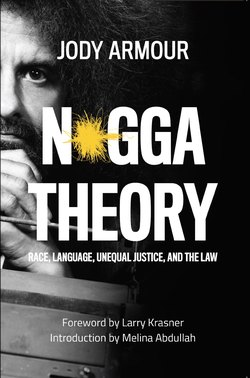Читать книгу N*gga Theory - Jody David Armour - Страница 7
На сайте Литреса книга снята с продажи.
ОглавлениеForeword
by Larry Krasner
When I heard that Kobe Bryant died in January, 2020, I immediately thought of USC Law Professor Jody Armour. A little-known fact about Professor Armour is that he held Lower Merion High School basketball records for more than a decade before Kobe broke them during his own high school years. That high school is public, affluent, and located in the suburbs of Philadelphia, where Kobe was born, spent part of his childhood, and is still a favorite son. Jody Armour’s enrollment in that high school, so far from where he was born and spent his younger years, was unexpected. Professor Armour’s years at Lower Merion High may seem like a small detail, but it’s a detail that matters in his challenging and successful life, like all details in a life we care to see.
It would be easy for Armour to trumpet the many achievements in his remarkable career as a critical legal theorist and law professor, easy for anyone to suggest his exceptionalism. Others claim their own superiority often—in writing, from the bench, in politics. They suggest their success was inevitable and certain, in their nature and deserved. They erase the true story of their mentors and their luck. Armour, though, tells the truth. He admits that his outcome was uncertain—no more certain than anyone else’s and no more deserved. In this book, intermingled with his theory, Armour gives us a few of his life’s details.
At its beginning and end, the book is an homage to Armour’s father, who jailhouse-lawyered his way out of a prison cell, past the dirty prosecutor who unjustly convicted him. His father’s “other-ization” was at the hands of an unscrupulous prosecutor who lied to win a conviction rather than tell the truth and risk losing. As Professor Armour explains, his father overcame this “other-ization” (a 22- to 55-year sentence in jail on charges of selling marijuana) by sitting on the floor of his cell banging away on a manual typewriter for years. This jailhouse lawyer, perhaps inadvertently, mentored his son, encouraging him to become a lawyer and law professor. The jailhouse writer used the written word to free himself, and his son wrote a book affirming the power of words to free other people.
Armour tells us a few details of his youth in Akron, Ohio. His family slid into poverty during his father’s incarceration; his city simultaneously collapsed economically as the tire industry disappeared; his talented friend suffered a downfall after being convicted of a crime in his youth (Armour himself just missed the same outcome); and he then had the unexpected good fortune to attend an excellent high school far from home, thanks to a government program.
He lets us see how within his beloved black community the politics of division do sweeping harm that no amount of success can shake. He uses the details of his family’s life, again, to explain the duality of civil rights achievement and harmful division, a duality that created the relatively privileged black neighborhood where he lives in LA. He explains his own and his children’s complex connection to the neighborhood, to policing, and to the city that is still defined by division, division by and within race.
These occasional details taken from his and other people’s lives bind together so many of the important themes of his theory, attaching them to the reader’s memory and simultaneously explaining the deep humility and compassion in Armour’s thinking. Armour rejects the divisive tactics of our current, racist, carceral criminal justice system. He rejects the “other-ization” of anyone by anyone for any reason. No one gets a free pass to divide and scapegoat and over-incarcerate, not even radicals and progressives opining on powerful people who have committed crimes.
For me, as a criminal defense and civil rights attorney whose life’s work has been in criminal justice and who now tries to be fair as a progressive prosecutor, this book directly and indirectly illuminates so much of what needs reform in our criminal justice system. Armour’s father’s life was truly individual and unexpected, much like Armour’s has been, and much like yours has been and mine, and much like anyone else’s life we actually try to see.
And there, for me, is an essential point. We need to try to see individuals in order to do any kind of justice. The idea of a binary world of monsters and saints whose unchanging goodness or badness is evident from one or a few actions, from their poverty, or from their race, is false. Stereotypes and assumptions based on the idea of a static and unchanging criminality either in individuals or in groups are false. And we have codified these falsehoods into laws and procedures that deliberately refuse to see individuals’ lives, and especially refuse to see details that are unexpected. Our broken criminal justice system has rejected individual justice and the discretion it requires, and instead insists on robotic and inflexible mandatory sentencing, sentencing guidelines, death sentences, life without possibility of parole, the actual or de facto elimination of sentence modifications, pardons, commutations, expungement, and record sealing.
Real change in the broken criminal justice system we have built requires real change in its foundation, which requires us to care enough to see people’s lives within our own community and within all communities, and requires us to operate under a new theory, one that allows us to reject division and reject turning our brothers and sisters into “the other.” With much greater theoretical nuance and sophistication than this foreword can provide, this hopeful and aspirational book reminds us to see individuals and their lives, including the details, however unexpected.
